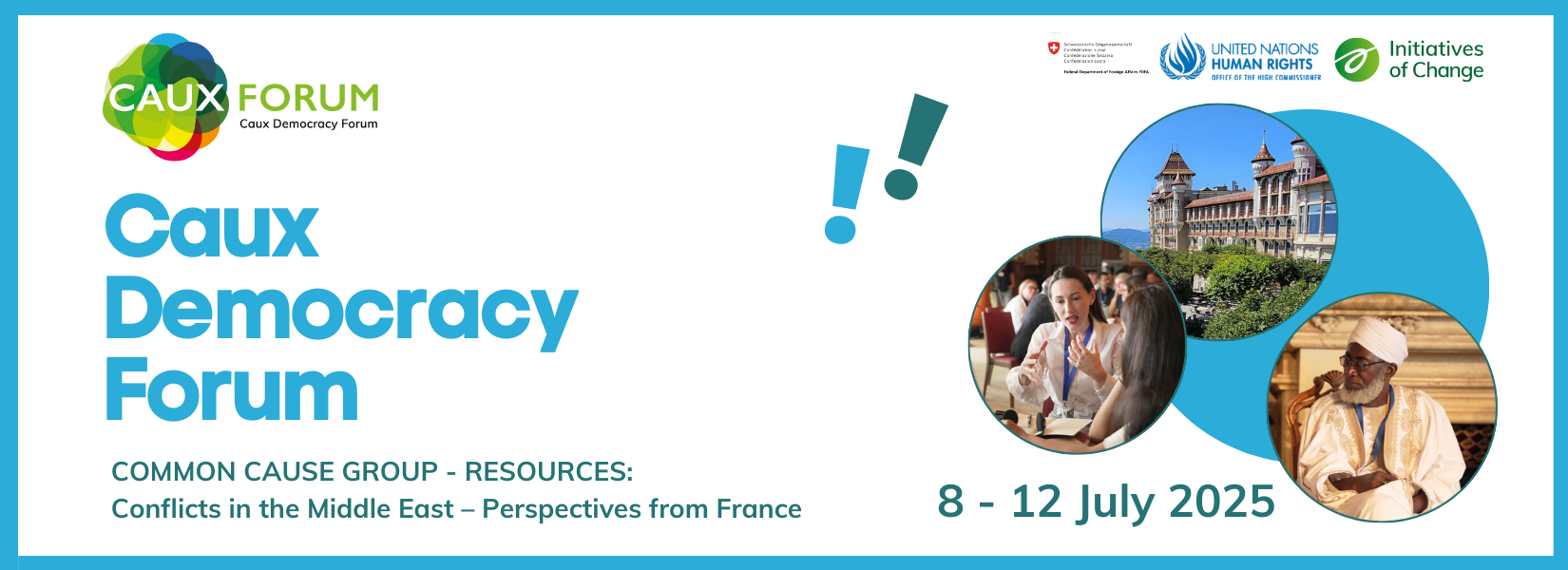Caux Democracy Forum 2025: Common Cause Group FR
Conflicts in the Middle East – Perspectives from France
Caux Democracy Forum 2025 - Resources
As part of the Caux Democracy Forum held 8 - 12 July 2025 in Caux, Switzerland, Initiatives et Changement France organised a series of three exceptional round tables that will explore the complexities of Middle Eastern conflicts through French perspectives—drawing on diverse academic, religious, and civic voices.
Moderated by Brahim HAMMOUCHE (France), Head of the Psychiatry Department, Metz-Thionville Hospital, former Member of Parliament Moselle/France, the conversations offered a unique opportunity to foster deeper understanding, mutual respect, and innovative thinking.
READ THE FULL REPORT (in French)
______________________________________________________________________________________________
SESSION 1: Restoring mutual understanding and recognition as a prerequisite for trust
At the heart of Initiatives of Change’s philosophy is the belief that healing begins with acknowledging the inner motives, emotions, and prejudices of all those affected by conflict. To overcome division, the traumas and feelings of fear, insecurity, racism, injustice, betrayal,hatred, powerlessness, despair, and manipulated identities must first be heard and understood.
With:
- Radjaa ABOUDAGGA (France), Geostrategic Advisor
- Janine ELKOUBY (France), Professor of classical literature and former vice-president of the Jewish Consistory of the Bas-Rhin
- Pierre HASKI (France), Journalist (pre-recorded speech)
- Yoav LEVY (France), Teacher of biblical studies and specialised in Hebrew text
and others.
______________________________________________
SESSION 2: Religions, both instruments of conflict and potential sources of peace
In this region, where the three major monotheistic religions originated, spirituality can be both exploited for political ends and harnessed as a powerful force for healing and reconciliation. This round table explored how religious traditions contribute to conflict, but also how they can serve as bridges to peace and understanding.
With:
- Hervé Élie BOKOBZA (France), Theologian & Writer
- Ghaleb BENCHEIKH (France), Islamologist & President of the Foundation of Islam in France
- Claire REGGIO (France), Teacher & Trainer, Aix-Marseille University & Domuni Universitas
- Antoine ARJAKOVSKY (France), Director of Research, Collège des Bernardins, Paris
and others.
______________________________________________
SESSION 3: Building international awareness of the Middle East Conflicts
This third session focussed on the role of civil society and European nations in fostering a shared global consciousness around these conflicts. It explored how to rehumanise international relations, galvanise social energy, and give real substance to human rights and solidarity.
With:
- Rafaël TYSZBLAT (France), Mediator & Trainer in Interconvictional and Interidentity Dialogue at Connecting Actions
- Bertrand BADIE (France) (pre-recorded speech), Political Scientist & Expert in International Relations
- Alain MICHEL (Switzerland), Co-founder & President of ÉquiLibre, Founder of Hommes de Parole
- DR. Peter SHAMBROOK (UK), Independant Scholar, Author & Historical Consultant at the Balfour Project
- Elio AZAR (Lebanon), Special Initiatives Coordinator, Principles for Peace
and others.
______________________________________________________________________________________________
Watch the interviews with Pierre HASKI and Bertrand BADIE
In the first video (21m45s, in French, May 2025), Pierre HASKI, journalist and president of Reporters Without Borders, discusses a historic turning point marked by the weakening of international law... and its replacement by the balance of power.
"The creation of the State of Israel was a decision supported by the United Nations in 1948, with the backing of the Europeans. We have a direct responsibility for what has happened… What are the traumas of a people that make them what they are today and give them their current mindset? This common gesture of understanding the trauma of the other remains absolutely fundamental. It is even more complicated today than it was in 1993, at the time of the Oslo Accords. But it is essential.”
In a second video (18m27s, in French, June 2025), three young people ask Bertrand BADIE, Emeritus Professor of Political Science, Paris: What steps could be taken to rehumanise international relations, build social energy and give substance to human rights?
"Peace begins with social behaviour. In short, peace is not just the absence of war. Peace means building a world order that meets the fundamental needs of humanity and also the right to be respected, the right to escape humiliation. There can be no peace without the will to coexist with others who, by definition, are different from me. If we return to the Middle East, there can be no peace without coexistence. And what is coexistence? It is living together. It is recognising the other's right to exist, to exist humanly, socially, economically, culturally and politically."
